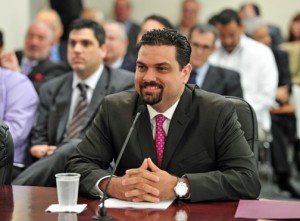‘Net neutrality’s’ effect uncertain on P.R.’s telecom sector

The effects of the recently approved “net neutrality” will have on Puerto Rico’s telecommunications industry are still uncertain, because the public and private sectors are holding off until the official order is released to either celebrate or voice their opposition, this media outlet learned.
Late last week, the Federal Communications Commission voted to regulate broadband Internet service as a public utility, same as telephones, “to protect the people’s best interests.”
The new rules are intended to ensure that no Internet service provider will block content or slow web traffic. The idea is for everyone to have equal access to high speed Internet. And if a company does something that a consumer understands is “unjust or unreasonable,” they can complain and the FCC could step in to investigate. But the federal agency says it will not apply some sections of the law, including price controls.
“The Internet is the most powerful and pervasive platform on the planet. It is simply too important to be left without rules and without a referee on the field. Think about it. The Internet has replaced the functions of the telephone and the post office,” FCC Chairman Tom Wheeler said last week.
“The Internet has redefined commerce, and as the outpouring from four million Americans has demonstrated, the Internet is the ultimate vehicle for free expression. The Internet is simply too important to allow broadband providers to be the ones making the rules,” he said.
Puerto Rico Telecommunications Regulatory Board President Javier Rúa-Jovet expressed his agreement with the FCC’s decision “on the point that the Internet must remain an open platform for free expression, innovation, and economic growth, but within a fair legal framework.”
However, he admitted that some issues are not clear, such as if “the new norm adopted will allow for maximum state [including Commonwealths and territories] protection of user/consumer rights such as contractual compliance, protection of privacy and other civil or constitutional rights particularly relevant in digital contexts,” Rua-Jovet told this media outlet.
“[It’s also not clear] if the new norm will specifically discuss the until-now relatively clear state authority to leverage Universal Service Funds to incentivize broadband, independently or in tandem with federal monies,” he said.
The public will have to wait for the FCC’s new “net neutrality” order for at least a few weeks. There is a waiting period of at least several days during which the federal agency will add edits and hold hearings. The agency will also consider the dissenting opinions of the commissioners who voted against the reclassification. It is only after the order is officially released and added to the federal register that any movement — legislative or judicial — can be taken.
Meanwhile, Puerto Rico’s Chief Information Officer, Giancarlo González, was also pleased with the FCC’s resolution, saying “this action opens a gateway to a neutral policy in which every Internet provider will be equally treated, in a fair and balanced way.”
“Democrats and Republicans are completely split regarding this issue, and that could affect this new regulation,” González said. “I hope that doesn’t occur. Big Internet providers have the economic ways to impose restrictions, ‘net neutrality’ will not allow that.”
On the other hand, Puerto Rico’s private sector was very cautious with its comments regarding the issue, and most of them told this news outlet that they “will wait for the revised document before making any expressions.”
Karen Larson, vice president of broadband service provider Critical Hub Networks, said that “the heart of ‘net neutrality’ is consumer protection from network operators and Internet Service Providers whose network management policies included the blocking, throttling or otherwise interfering with end user access to legal content, applications or services available on the Internet.”
“This is a win for consumers and for future innovation. There are also provisions in ‘net neutrality,’ which extends to interconnection practices between network operators and access to infrastructure necessary to deploy broadband networks,” she said.
“It remains to be seen if these provisions will help or harm the expansion and growth of broadband networks, particularly regarding issues such as local interconnectivity, local network peering and investments into broadband networks,” Larson concluded.













